
CeRDI Newsletter Spring 2020
In this issue:
- Message from the Director
- Funding success for Agricultural Research Federation (AgReFed) platform
- Pilot project: Mine rehabilitation trial data
- Dr Birgita Hansen leading Food Agility CRC Data Constellation
- Data Democracy short film in the spotlight at international film festival
- Ecological Society of Australia conference Citizen Science symposium
- Dementia Pathways Tool
- The Dementia Care in Hospitals program
- Regional Universities Network website
- Yarra Catchment Atlas
- CeRDI news snippets
- CeRDI postgraduate news
- About CeRDI
- Contact CeRDI
Message from the Director
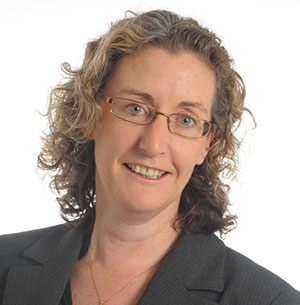 |
|
|
Associate Professor |
|
As the University looks towards 2021, its Strategic Directions for 2021–2025 are also taking shape. This vision for the next five years provides direction for the University across its teaching and research endeavours. The Centre for Research and Digital Innovation (CeRDI) will contribute to this vision; complementing the University’s directions through the continuation and extension of research activities through its collaborations, research activities and outputs that are nationally and internationally recognised.
Although 2020 has presented many challenges, for the CeRDI team it has also provided many opportunities that have enabled the fostering of partnerships and the establishment and completion of projects within our research themes. This is highlighted in the current news and stories from CeRDI.
The Agricultural Research Federation (AgReFed) platform has just received news about project funding. This will enable the acceleration of research and innovation, providing sector-wide improvements for data within Australia’s agricultural industries. The recognition of CeRDI as a leader in agriculture technology research and development has been further elevated with the recent appointment of CeRDI’s Dr Birgita Hansen in the role of Constellation Leader for the Better Data for Better Decisions constellation, which is a Food Agility CRC program of research, led by Federation University.
Federation University has recently been notified that it has been successfully funded by the Cooperative Research Centre for Transformations in Mining Economies (TiME CRC). A cross University collaboration will be supported through the conduct of a pilot study into Mine Rehabilitation Trials Online (MRTO). CeRDI’s Associate Professor Pete Dahlhaus together with Geotechnical and Hydrogelogical Engineering Research Group’s Prof Thomas Baumgartl will be leading the project.
Funding success for Agricultural Research Federation (AgReFed) platform
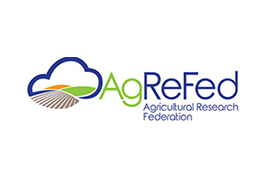 |
|
|
Agricultural Research Federation (AgReFed) |
|
Federation University Australia and the Australian Research Data Commons (ARDC) have announced a new project that will accelerate research innovation and enhance the Agricultural Research Federation (AgReFed) platform. The AgReFed platform supports collaboration and innovative insights in agricultural research, development and policy by improving the discoverability of trusted, reusable and analysis-ready agricultural research data across Australia.
This is one of 16 new collaborative projects in the ARDC 2020 Platforms program aiming to facilitate and encourage radical changes in the way research is conducted, and dramatically increase the speed of research.
CeRDI will lead the new project to increase the platform’s ability to adapt to the way agricultural researchers collect, describe, and disseminate their research findings. The project will address some of the current challenges facing agricultural researchers, who perform data management and analysis on desktop computers. Many have limited access to platforms, workflows and analysis tools designed for agricultural research.
Pilot project: Mine rehabilitation trial data
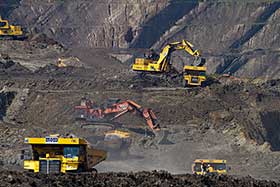 |
|
The Mine Rehabilitation Trials Online (MRTO) is one of 22 foundation projects funded by the Cooperative Research Centre for Transformations in Mining Economies (CRC TiME)*. The 10-month project aims to establish and pilot, agreed data stewardship and governance frameworks, that will provide a platform for sharing Australian mine rehabilitation trials data and information from both private and public sources. The project will pilot two case studies – one in Western Australia’s Pilbara region and the other in Victoria’s Latrobe Valley precinct – to demonstrate the potential rewards for the industry and test the social and technical architectures.
The most significant research challenge is expected to be finding clear incentives for participants to share their data. For such knowledge management projects to succeed and endure, data custodians need to see high rewards, no penalty or cost, and require little effort to participate. A key aspect of success is determining what the industry participants would like to get out of the research and how the proposed federation of data might provide them with new insights or save them time and money. The expected outcome will be an online portal for the pilot case studies, to demonstrate tangible value in supplying data, and information related to mine closure, and mine closure planning, that can benefit the industry and society.
Dr Birgita Hansen leading Food Agility CRC Data Constellation
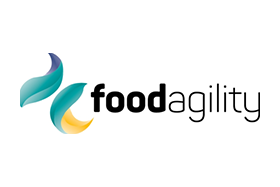 |
|
|
Food Agility CRC Data Constellation |
|
CeRDI’s Senior Research Fellow Dr Birgita Hansen recently commenced in the role of Better Data for Better Decisions Constellation Leader with the Food Agility Cooperative Research Centre (CRC). The constellation is a Food Agility program of research that aims to improve the collection, management, sharing and use of farm data in the agri-food sector.
The Better Data for Better Decisions Constellation ![]() is underpinned by the FAIR (findable, accessible, interoperable, reusable) principles for data. This sets an ambitious but exciting target for the constellation: namely, to establish FAIR data projects in the agriculture sector, improve digital adoption and data sharing, while meeting Food Agility’s objective of developing digital innovations that have economic benefits for the sector.
is underpinned by the FAIR (findable, accessible, interoperable, reusable) principles for data. This sets an ambitious but exciting target for the constellation: namely, to establish FAIR data projects in the agriculture sector, improve digital adoption and data sharing, while meeting Food Agility’s objective of developing digital innovations that have economic benefits for the sector.
Data Democracy short film in the spotlight at international film festival
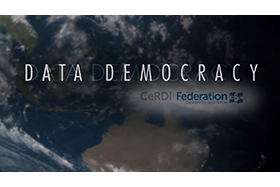 |
|
|
Data Democracy short film in the spotlight |
|
A CeRDI commissioned short film called Data Democracy was recently accepted into the Silicon Valley International Film Festival in the United States. The film explores the concepts of a data democracy, and will screen at an event where tech industry leaders congregate to view the films and engage with their creators.
CeRDI’s Associate Professor Peter Dahlhaus said the film title referred to the ideal system in which data could be accessed in a timely and equitable way, which is a key focus of the Centre and its research partnerships.
There are many public benefits from accumulating, federating and aggregating data, but the use of data by governments and private institutes has become highly controversial, raising important questions about access, rights and community interest in the digital and geospatial age. CeRDI’s involvement in the development of the film is important. The Centre has developed many award-winning, web-based spatial information and knowledge portals, which provide public access to data sets that are often hidden from view.
Ecological Society of Australia conference Citizen Science symposium
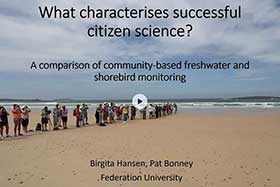 |
|
|
Ecological Society of Australia |
|
CeRDI team members Dr Birgita Hansen and Pat Bonney co-authored a presentation for the Ecological Society of Australia conference held online between 30 November and 3 December 2020. Birgita presented the talk in the Citizen Science symposium, convened by Katie Irvine at University of Adelaide and TERN. The symposium entitled Citizen Science: a tool for ecology, conservation and science communication, drew together a range of excellent speakers delving into topics like wedge-tailed eagle monitoring in Tasmania, the CAUL wildlife app for collecting urban flora and fauna observations, the cybertracker app, tips for designing environmental engagement programs and building ecological literacy in the community.
Birgita and Pat presented a perspective piece called What characterises successful citizen science? The focus of discussion was two long-term programs: Waterwatch Victoria and National Shorebird Monitoring. Both programs have been in existence for decades and have a large and dedicated group of volunteers who are central to the success of both programs. However, they have different histories in terms of environmental context for monitoring, objectives, and data uptake and influencing decision makers. Collectively, they provide lessons for others considering establishing new citizen science projects or running their citizen science projects over long time-frames. The format of the conference was pre-recorded talks in individual sessions.
Birgita and Pat’s talk can be viewed here:
www.dropbox.com/s/zzwq8v7op6ahfvu/Hansen_Session7_Citizen_Science_GMT20201112-090307_ESA-talk-a_2560x1440.mp4?dl=0 ![]()
Dementia Pathways Tool
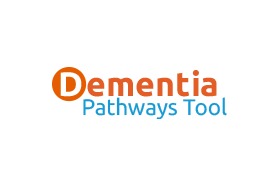 |
|
|
Dementia Pathways Tool |
|
Updates to Dementia Pathways Tool are currently underway, with CeRDI working closely with Associate Professor Mark Yates from Ballarat Health Services and Deakin University, and Caroline Gibson to review and update content and useful links on the tool.
The Dementia Pathways Tool was developed and launched in 2013 as a repository of information about dementia, and a pathways tool to assist general practitioners, practice nurses, and carers navigate information about diagnosis, service referrals and care for patients with dementia. The tool has since undergone numerous modifications, ensuring its content remains current and relevant, and new information is available to users of the tool.
Additional content currently under development for future integration within the tool includes dementia-specific green prescriptions linked to local parks and walks. Updated weblinks and content for essential reporting and assessment are also underway. New and updated links to key resources will continue to be made available.
The Dementia Care in Hospitals program
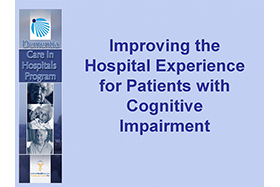 |
|
|
The Dementia Care in Hospitals program |
|
The Dementia Care in Hospitals program is an initiative of Associate Professor Mark Yates (Ballarat Health Services and Deakin University) and Ballarat Health Services. The program is aimed at reducing the risks for people with dementia when they are in hospital. A key feature of the program is an e-learning module to improve the training of acute hospital staff to respond appropriately to support patients with dementia. The program, which is an ‘all of hospital’ education program, is designed to improve the awareness of and communication with patients with dementia and is linked to a visual alert called the cognitive impairment identifier (CII).
The Dementia Care in Hospitals program was introduced at Ballarat Health Services in 2003 with the support of the Department of Health. The program was integrated as an online e-learning module following collaboration with CeRDI in 2017. CeRDI continues to support this program and provides regular updates to the e-learning modules in response to updates dementia care.
Regional Universities Network website
.jpg) |
|
|
Regional Universities Network website |
|
In 2020 the Regional Universities Network (RUN) worked with CeRDI and Elise Whetter from Celtink Creative to redevelop their website. When first embarking on this project, the following goals for the website redevelopment were established: a refresh of the website's brand, a restructuring of the website's content, the introduction of embedded video content, the ability for content managers to create content rich publication web pages, and a responsive website design for all devices.
Initially RUN worked with Elise to develop the new website designs. Once the designs were approved, RUN then worked with Craig Briody from CeRDI to develop a new contemporary website.
The new Regional Universities Network website was launched during October 2020. CeRDI has hosted the RUN website since 2012.
Yarra Catchment Atlas
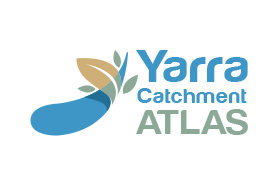 |
|
The Yarra Catchment Atlas is a spatial information portal featuring biodiversity, environmental and cultural information for the Yarra Catchment. CeRDI has partnered with the Yarra Riverkeeper Association (YRA) on this project, having completed substantial work on the online information portal in 2019. Recently, upgrades were made to support greater community reporting of pollution data.
The portal now enables the recording of observations about polystyrene pollution (map.yarraatlas.org.au/sights ![]() ), including a new polystyrene rating tool that allows recording of polystyrene litter hotspots, and provides an additional mechanism for polystyrene pollution data to be documented. Upon approval by the YRA, these observations are documented and visualised in the online mapping portal: map.yarraatlas.org.au/?view=16268_3c7ff35
), including a new polystyrene rating tool that allows recording of polystyrene litter hotspots, and provides an additional mechanism for polystyrene pollution data to be documented. Upon approval by the YRA, these observations are documented and visualised in the online mapping portal: map.yarraatlas.org.au/?view=16268_3c7ff35 ![]()
CeRDI news snippets
Aboriginal Heroes of Fire, Flood and Food project
Associate Professor Fred Cahir from the School of Arts recently received funding from the Telematics Trust for a project that will document, digitise and deliver the first comprehensive map of Aboriginal heroism in relation to fire, flood and the search for food in Victoria (for the period 1800–1930). The project will involve bringing information and knowledge to life in accessible and visual formats via a digital map, documentary film and research publications to inform public discussion about the significant contribution of Aboriginal society to the foundational stories of Australia. CeRDI will support the project’s technology components, including the digitisation and mapping components.
Impact research resumes with Online Farm Trials: Impact research has re-commenced for Grains Research and Development Corporation funded Online Farm Trials ![]() (OFT). OFT is a web-based system that provides open and free access to on-farm, or field based, cropping research trial data and information. Impact research has previously been conducted and reported, providing extended insights about the role of technology on users; their knowledge, decision making and work practices. CeRDI’s Dr Angela Murphy developed the materials for and completed the first round of data collection, with these existing survey and interview tools again used to collected data that will identify new and existing usage and contribution of online portals on users within the agriculture theme. Dr Alison Ollerenshaw is assisting the OFT team at Federation University to collect data to inform this latest round of research. Online surveys are available for users on the OFT website.
(OFT). OFT is a web-based system that provides open and free access to on-farm, or field based, cropping research trial data and information. Impact research has previously been conducted and reported, providing extended insights about the role of technology on users; their knowledge, decision making and work practices. CeRDI’s Dr Angela Murphy developed the materials for and completed the first round of data collection, with these existing survey and interview tools again used to collected data that will identify new and existing usage and contribution of online portals on users within the agriculture theme. Dr Alison Ollerenshaw is assisting the OFT team at Federation University to collect data to inform this latest round of research. Online surveys are available for users on the OFT website.
CeRDI postgraduate news
Thesis examination
Congratulations to Patrick Bonney who was recently notified that his PhD thesis has been examined and was passed subject to some minor corrections and clarifications. Pat’s thesis, entitled ‘Citizen science: Knowledge, networks and the boundaries of participation’, focused on citizen science and social research in relation to Waterwatch Victoria, community-based freshwater monitoring and environmental governance. Pat’s supervisory team includes Dr Angela Murphy (Principal), Dr Birgita Hansen and Professor Claudia Baldwin (USC). Pat’s research was supported by the Regional University Networks (RUN) Water Flagship. For further information about Pat’s research see: www.cerdi.edu.au/cb_pages/patrick_bonney.php
Confirmation of candidature
Derek Walters successfully completed his confirmation of candidature in late November for his PhD research ‘Evaluating the Influence of Port Phillip Groundwater’. Derek’s research aims to determine the value of groundwater to the region of Port Phillip Bay, with attention focussed on the social, economic, environmental and cultural assets, and inform and enable best management of groundwater resources around Port Phillip. Derek is supervised by Associate Professor Peter Dahlhaus and Dr Ander Guinea (School of Engineering, Information Technology and Physical Sciences). For more information about Derek’s research: www.cerdi.edu.au/cb_pages/derek_walter.php
About CeRDI
The Centre for eResearch and Digital Innovation (CeRDI) is a research centre at Federation University Australia focused on:
- the application of information and communications technology (ICT) and the development of innovative, world class knowledge management systems;
- significantly advancing the digital literacy and knowledge management capabilities of partner organisations;
- fostering partnerships for the development and implementation of eResearch with industry, government and academia; and
- measuring the impact of eResearch and digital innovation through longitudinal research.
Contact CeRDI
For further details about CeRDI’s diverse portfolio of research please visit our website: www.cerdi.edu.au, or contact Director, Associate Professor Helen Thompson: h.thompson@federation.edu.au
Mailing Address
Centre for eResearch and Digital Innovation
Federation University Australia
PO Box 691
Ballarat Vic 3353
Office Location
Suite 15, Greenhill Enterprise Centre
Ballarat Technology Park
University Drive
Mount Helen Vic 3350
Phone: +61 3 5327 9314
Email: support@cerdi.edu.au
Subscribe to the CeRDI Newsletter Mailing List
I would like to subscribe to the CeRDI Newsletter Mailing List to receive notifications of future CeRDI Newsletters.
If you have any feedback, please email newsletter@cerdi.edu.au

.png)
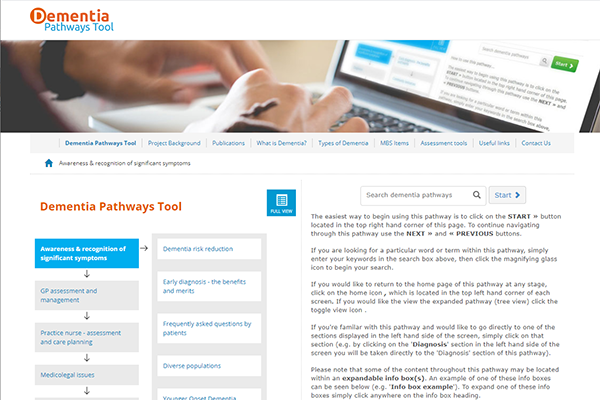
.jpg)